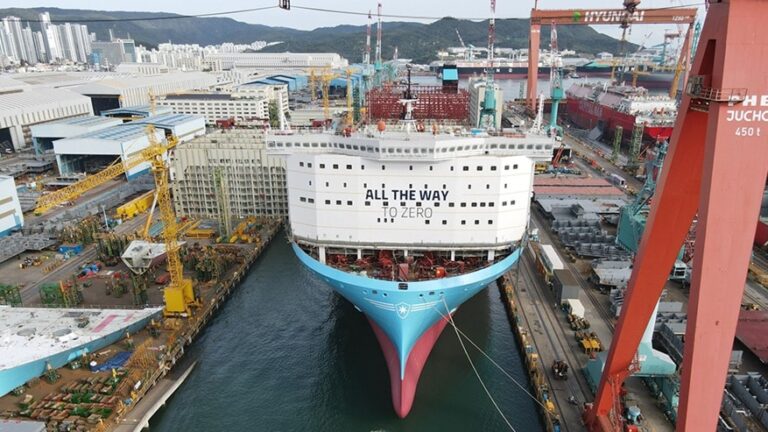Maersk will launch the first of its 18 large methanol-enabled vessels currently on order. On February 9, 2024, the vessel will enter service on the AE7 string connecting Asia and Europe, which includes port calls in Shanghai, Tanjung Pelepas, Colombo and Hamburg, with Ningbo, China, its first destination.
The container vessel built by Hyundai Heavy Industries (HHI) in South Korea has a nominal capacity of 16,000 containers (TEU) and is equipped with a dual-fuel engine enabling operations on methanol as well as biodiesel and conventional bunker fuel.
Maersk has set a net-zero greenhouse gas emissions target for 2040 across the entire business and has also set tangible and near-term targets for 2030 to ensure progress. Maersk has secured sufficient green methanol to cover the vessel’s maiden voyage and continues to work diligently on 2024-25 sourcing solutions for its methanol-enabled vessel fleet.
Maersk defines “green fuels” as fuels with low to very low GHG emissions over their lifecycle compared to fossil fuels. Different green fuels achieve different lifecycle reductions depending on their production pathway. By “low” the company refers to fuels with 65-80% lifecycle GHG reductions compared to fossil fuels. This covers, for example, some biodiesels. “Very low” refers to fuels with 80-95% lifecycle GHG reductions compared to fossil fuels.
Ahead of its deployment, the vessel will be named at the shipyard at the end of January next year. The following two sister vessels will be deployed in the first half of 2024 with naming events taking place in Yokohama, Japan, and Los Angeles, California. Maersk expects to take delivery of four additional sister vessels in the second half of 2024.
At the time of deployment of the first large vessel, it will be the second container vessel in the world that can sail on green methanol, Maersk reports, the first being the feeder vessel Laura Maersk which entered service in September in 2023.
Karsten Kildahl, chief commercial officer at Maersk, said, “Deploying the first of our large methanol-enabled vessels on one of the world’s largest trade lanes, Asia-Europe, is a landmark in our journey toward our net-zero target. With the vessel’s capacity of 16,000 containers, this will make a significant impact on our customers’ efforts to decarbonize their supply chains, and we are looking forward to introducing more methanol-enabled vessels on this and other trades during 2024.”
For more key marine renewables updates from the electric and hybrid marine technology industry, click here.



